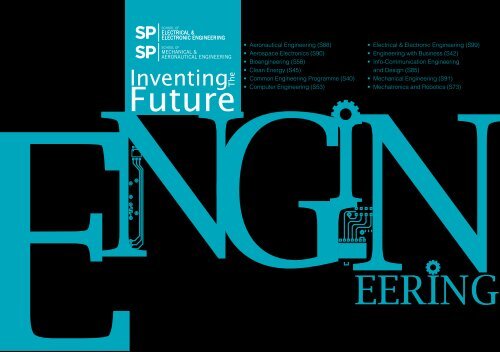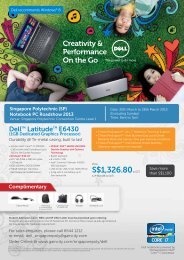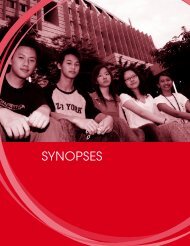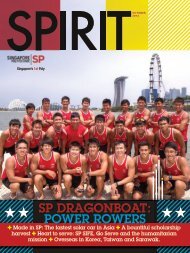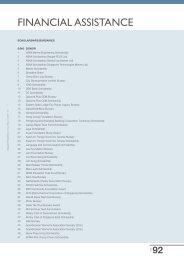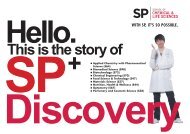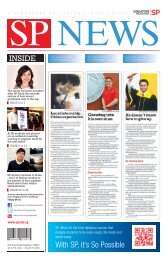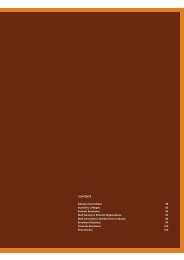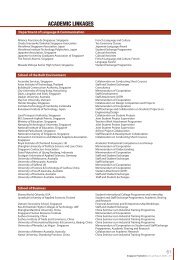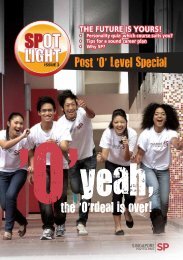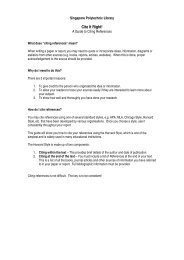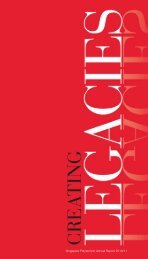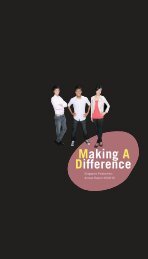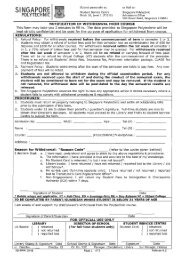Aeronautical Engineering (S88) - Singapore Polytechnic
Aeronautical Engineering (S88) - Singapore Polytechnic
Aeronautical Engineering (S88) - Singapore Polytechnic
- No tags were found...
You also want an ePaper? Increase the reach of your titles
YUMPU automatically turns print PDFs into web optimized ePapers that Google loves.
InventingTheFutureEngineers are responsible for the technologiesthat improve our lives in many ways. Thisis one profession where creativity andingenuity know no limits, bringing a senseof satisfaction and pride. If you are lookingfor challenges, then engineering is for you.02
WhySP has a comprehensive range of engineeringcourses for young people with interests spanningfrom aircraft to clean energy and from productdesign to computers. We place a strong emphasison creativity, project management, team workand hands-on engineering experiences. As astudent, you will go through the CDIO (Conceive– Design – Implement – Operate) and DesignThinking Processes. By the time you graduate,you will be able to conceive innovative solutionsbased on real user needs.SP has an illustrious engineering history withmany distinguished alumni in the engineeringand business sectors. We are the first to offerengineering courses in <strong>Singapore</strong>. We benchmarkwith the best in engineering education bycollaborating with reputable institutions suchas the Rotman School of Management andthe Olin College of <strong>Engineering</strong>. We spare noeffort in re-structuring our training to deliverthe latest in engineering practice with stateof-the-artfacilities.SP <strong>Engineering</strong> ScholarshipSP is the first polytechnic to launch a scholarship for engineering students. As ascholar, you will be identified for research and development attachments locallyor overseas and attend engineering conferences and activities to keep abreastof developments in related fields.Diploma Plus ProgrammesYou can opt for a university-preparatory or career-oriented Diploma Plus Programmeto gain a competitive edge. Courses offered under this programme include:• Applied Psychology• Business• Computer Networking• Design Thinking• Digital Media Creation• Enterprise Linux Administration• Humanitarian Affairs• Software Programming & Applications• Sustainability• Theatre Performance and ProductionFor more information, visit www.sp.edu.sg and check out the Diploma Plus Guide.Advanced ModulesYou can also enrol in Advanced Modules that will help in your university studies.Capable students can opt for Advanced Modules that are designed to add greaterdepth of knowledge in key areas.Refer to individual course modules for list of Advanced Modules available.Download the free Tag Reader app onto your smartphone andscan this code for more details on <strong>Engineering</strong> courses.03
Diploma ineronautical<strong>Engineering</strong>(DARE – <strong>S88</strong>)SP is the first polytechnic to offer an aeronauticalengineering diploma course and is currentlythe most-sought after engineering course.It was launched in 2002 in response to the rapidlyexpanding aerospace industry in <strong>Singapore</strong>and the Asia Pacific region. Our premier statusin education has spawned sturdy bonds withmore than 80 aerospace organisations, includingthe Republic of <strong>Singapore</strong> Air Force.Our state-of-the-art facilities simulate realworking environments that include a fighteraircraft and helicopter, and our own designedand built full-motion flight simulator.04
Our uSPsThis diploma course is fully aligned to Section 66 of the<strong>Singapore</strong> Airworthiness Requirements (SAR66) and it allowsyou to sit for the SAR 66 Basic Examinations that qualifies youto become a Licensed Aircraft Maintenance Engineer.You will receive specialised aeronautical engineering skillsand knowledge that will prepare you to effectively contributeto the global aerospace industry.EntryRequirementsAggregate Type: ELR2B2-CSubjectGradea) English Language 1 - 7b) Mathematics(Elementary/Additional) 1 - 6c) One of the following3 rd relevant subjects: 1 - 6• Biology• Chemistry• Design & Technology• Fundamentals of Electronics• Physics• Science (Chemistry, Biology)• Science (Physics, Biology)• Science (Physics, Chemistry)Applicants must not suffer from eithercolour appreciation or hearing deficiency.05
DARE is a three-year full-time programme.FIRSTYEAR• Basic Mathematics• Computer-Aided Drafting• Electrical Technology• Electronics• <strong>Engineering</strong> Materials I• <strong>Engineering</strong> Mathematics I• Introduction to <strong>Engineering</strong>• Mechanics I• Teamwork & CommunicationSkills• Thermofluids I• Critical Reasoning andArgumentation• Critical Reasoning andPersuasionSECONDYEAR• Air Legislation & Management• Aircraft Electrical & InstrumentSystems• Aircraft MaintenancePractices• Aircraft Power Plants I• Communication Skills for Work• Computer Programming• Computer-Aided Design(<strong>Aeronautical</strong>)• <strong>Engineering</strong> Materials II• <strong>Engineering</strong> Mathematics II (A)• <strong>Engineering</strong> Mathematics II (B)• Fundamentals of Flight• Mechanics II• Social Innovation Project• Independent Study Project &PresentationTHIRDYEAR• Aerospace Materials• Aircraft Power Plants II• Aircraft Structures• Aircraft Systems• Avionics• Human Factors• Mechanics III• Quality Management(<strong>Aeronautical</strong>)• ProjectAdvanced Modules (optional)• Advanced Mathematics 1• Advanced Mathematics 2• Advanced Mathematics 3• Aerospace ComponentsManufacturing• Aircraft Dynamics & Control• Finite Element Methods• Higher Mathematics• Product Design &Development06
Diploma inerospaceElectronics(DASE – S90)Fast jets, unmanned aerial vehicles and otherflying objects. Your dreams can take flightwith the Diploma in Aerospace Electronics(DASE). DASE will provide you with specialisedknowledge to meet the needs of the boomingaerospace industry. It is projected that by2018, about 10,000 more jobs in servicing,manufacturing, maintenance, repair, overhaulof aircraft and aerospace components willbe created.08
Our uSPsSP is the first polytechnic to offer a Diploma in AerospaceElectronics and it is one of the most sought-after engineeringcourses in <strong>Singapore</strong>. The course is fully aligned to the<strong>Singapore</strong> Airworthiness Requirements (SAR 66) for the licensingof Aircraft Maintenance Engineer specified by the Civil AviationAuthority of <strong>Singapore</strong>. Upon completion of the course, you willbe ready to sit for the SAR 66 Basic Examinations.You can opt to complete your academic programme in fivesemesters and use the last semester to complete a multidisciplinaryaerospace electronic project.EntryRequirements• Tripartite Maritime ScholarshipScheme (TMSS)Aggregate Type: ELR2B2-C• Seafaring Alternative - AnInvestment for Life (SAIL)• Association of Marine IndustriesSubject (ASMI)Gradea) English Language 1 - 7b) Mathematics(Elementary/Additional) 1 - 6c) One of the following3 rd relevant subjects: 1 - 6• Biology• Chemistry• Design & Technology• Fundamentals of Electronics• Physics• Science (Chemistry, Biology)• Science (Physics, Biology)• Science (Physics, Chemistry)Applicants must not suffer from eithercolour appreciation or hearing deficiency.09
DASE is a three-year full-time programme.FIRSTYEAR• Basic Mathematics• Computer-Aided Design &Drafting• Digital Electronics I• Digital Electronics II• <strong>Engineering</strong> Mathematics I• Introduction to <strong>Engineering</strong> I• Introduction to <strong>Engineering</strong> II• Principles of Electrical &Electronic <strong>Engineering</strong> I• Principles of Electrical &Electronic<strong>Engineering</strong> II• Program Design• Structured Programming• Teamwork & CommunicationSkills• Critical Reasoning andArgumentation• Critical Reasoning andPersuasionSECONDYEAR• Aircraft ElectricalFundamentals• Aircraft Servomechanismsand Electronics• Aircraft Systems Project• Analog CommunicationSystems• Circuit Theory & Analysis• <strong>Engineering</strong>Mathematics II (A)• <strong>Engineering</strong>Mathematics II (B)• Microcontroller Applications• Report Writing Skills• Workplace CommunicationSkills• Industrial Training Programme• Social Innovation Project• Independent Study Project &PresentationTHIRDYEAR• <strong>Aeronautical</strong> <strong>Engineering</strong>Science• Aircraft Automatic Flight andElectronic Systems• Aircraft Communication &Navigation Systems• Aircraft Electrical Systems• Aircraft Instrument Systems• Aircraft Radio and OpticalCommunications• Human Factors• Quality and Reliability• Final Year ProjectAdvanced Modules (Optional)• Advanced AnalogueElectronics• Advanced Circuit Analysis• Advanced ComputerProgramming• Advanced Digital Electronics• Advanced Mathematics 1• Advanced Mathematics 2• Advanced Mathematics 3• Higher Mathematics• Physics for Engineers• Signals & Systems10
Exciting career opportunities await you upon your graduation.Your career options include Aerospace <strong>Engineering</strong> Officer;Electrical and Electronic Engineer; Sales and Marketing Engineer;Aircraft Maintenance Engineer of commercial aircraft, fighterjets, helicopters and transport aircraft.Further StudiesYou can gain direct entry with advanced standing intoAerospace <strong>Engineering</strong>, Electrical & Electronic <strong>Engineering</strong>or Computer <strong>Engineering</strong> degree courses at local universities.For foreign universities in Australia, United Kingdom or UnitedStates, you will also get advanced standing in AerospaceElectronics-related degree courses. Within the three yearsof your DASE course, you can choose to complete threemodules offered by SIM University to qualify for a two-yearthrough-train degree programme in Bachelor of <strong>Engineering</strong>(Honours) in Aerospace Systems“No words can fully describe my exquisiteexperience while studying the DASE course inSP. Amiable lecturers who walked beside me asmy mentors and friends, well-equipped facilitiesthat cater to an ideal learning environment,international attachment to an aviation companyand a broad-based aviation course curriculumhave all prepared me well for work and furtherstudies.”– Lim Hui Yin, Class of 2011 from DASE, Lee Kuan YewAward winner, who will further her education at NanyangTechnological University.11
Diploma inioengineering(DBEN – S58)The Diploma in Bioengineering course will offer youmulti-disciplinary training in medical technology.The balanced grounding you receive in mechanicalengineering, electrical engineering and life scienceswill hone your skills in developing viable bioengineeringsolutions. You will collaborate with engineers, doctorsand scientists to improve health standards and thequality of life.Our graduates are valuable assets for the rapidlyadvancing biomedical sciences industry that constantlychurn out ground breaking equipment and innovativeprocedures!12
EntryRequirementsAggregate Type: ELR2B2-CSubjectGradea) English Language 1 - 7b) Mathematics(Elementary/Additional) 1 - 6c) One of the following3 rd relevant subjects: 1 - 6Our uSPsAs part of your extensive bioengineeringeducation, you will be involved incollaborative projects and gain first-handknowledge in areas such as HumanInterface Technology and AssistiveTechnology. Hands-on experience includesclinical and research projects with hospitalsand research institutions.• Biology• Chemistry• Design & Technology• Fundamentals of Electronics• Physics• Science (Chemistry, Biology)• Science (Physics, Biology)• Science (Physics, Chemistry)13
DBEN is a three-year full-time programme.FIRSTYEAR• Basic Mathematics• Computer-Aided Drafting• Electrical Technology• Electronics• <strong>Engineering</strong> Materials I• <strong>Engineering</strong> Mathematics I• Introduction to <strong>Engineering</strong>• Mechanics I• Teamwork & CommunicationSkills• Thermofluids I• Critical Reasoning andArgumentation• Critical Reasoning andPersuasionSECONDYEAR• Biofluids• BiomanufacturingEnvironment & ContaminationControls• Biomedical Equipment &Practices• Biomedical Instrumentation• Communication Skills for Work• Computer Programming• Design and Build I• <strong>Engineering</strong> Mathematics II• General Biochemistry• Introductory Anatomy &Physiology• Introductory Microbiology &Immunology• Mechanics II• Social Innovation Project• Independent Study Project &PresentationTHIRDYEAR• Assistive Technology &Rehabilitation <strong>Engineering</strong>• Biomanufacturing ProcessControl & Operations• Biomechanics• Biomaterials• Biostatistics• cGMP & Medical DeviceValidation• Design of Biomedical Devices• Genetics & Molecular Biology• Microcontroller Applications• Rapid Prototyping forBiomedical Applications• ProjectAdvanced Modules (optional)• Advanced Mathematics 1• Advanced Mathematics 2• Advanced Mathematics 3• <strong>Engineering</strong> Thermodynamics• Higher Mathematics• Physics for Engineers14
“My GPA of 3.9 has gotten me a place in NanyangTechnological University and a scholarship fromSembcorp. I’ll always be proud of SP!.”– Xu Wan, Class of 2011 from DBEN, who will pursuea degree in Mechanical <strong>Engineering</strong> at the NanyangTechnological University under a SembCorp scholarshipExciting career opportunities await you upon your graduation.You can develop your career as a Bioengineering Technologistwith bio-manufacturing companies, hospitals, pharmaceuticalsmanufacturing plants, healthcare organisations and biomedicalengineering services.Further StudiesYou can pursue further studies in related degree courses at localand foreign universities and receive module exemptions.15
Exciting career opportunities await you upon your graduation.Your career options include working as a Technologist withenergy and environmental companies and organisations in thepublic or private sectors; Technical Officers; Design Specialists;Assistant Engineers in the electrical engineering sector.Further StudiesYou can pursue a degree in engineering at local and foreignuniversities. You will gain advanced standing in degreeprogrammes from prestigious universities such as the AustralianNational University, University of New South Wales and theMunich University of Applied Sciences.“Global climate changes and resourcedepletion are two of the greatest challengesto human civilisation. All our current andfuture developments must be based onsustainable principles. It is timely for SP toeducate students on sustainable technologyincluding clean energy sources such assolar, wind, biomass and wave energy.”– Dr Toh Peng Seng, Managing Director,GrenZone Pte Ltd, <strong>Singapore</strong>19
ommon<strong>Engineering</strong>Programme(DCEP - S40)You are passionate about engineering but undecided withwhich course to take. Fret not. The Common <strong>Engineering</strong>Programme is carefully designed for you to make the rightchoice. During the first semester, you will be introduced to theworld of engineering where you get to dabble with mechanicalequipment, biomedical instruments, electrical circuits andelectronic gadgets to discover your interests and strengths.At the end of it, you will be able to make an informed choiceout of eight engineering courses – <strong>Aeronautical</strong> <strong>Engineering</strong>;Aerospace Electronics; Bioengineering; Clean Energy; Computer<strong>Engineering</strong>; Electrical and Electronic <strong>Engineering</strong>; Mechanical<strong>Engineering</strong>; Mechatronics and Robotics.20
Our uSPsThis programme offers youa wide range ofengineering choices tochoose from, giving you aninsight to what interestsyou the most.EntryRequirementsAggregate Type: ELR2B2-CSubjectGradea) English Language 1 - 7b) Mathematics(Elementary/Additional) 1 - 6c) One of the following3 rd relevant subjects: 1 - 6• Biology• Chemistry• Design & Technology• Fundamentals of Electronics• Physics• Science (Chemistry, Biology)• Science (Physics, Biology)• Science (Physics, Chemistry)21
CEP is a full-time first-semester programme and you will progress to one of eight full-timeengineering courses.FIRSTYEARSemester 1• Basic Mathematics• Computer-Aided Drafting• Digital Electronics I• Introduction to <strong>Engineering</strong> I• Mechanics I• Principles of Electrical &Electronic <strong>Engineering</strong>• Critical Reasoning andArgumentationSemester 2(for MAE diplomas DARE/DBEN/DME/DMRO)• <strong>Engineering</strong> Materials I• <strong>Engineering</strong> Mathematics I• Introduction to <strong>Engineering</strong> II• Teamwork & CommunicationSkills• Thermofluids I• Critical Reasoning andPersuasion(for EEE diplomas DASE/DCEG/DCPE/DEEE)• Digital Electronics II• <strong>Engineering</strong> Mathematics I• Introduction to <strong>Engineering</strong> II• Principles of Electrical &Electronic <strong>Engineering</strong> II• Structured Programming• Teamwork & CommunicationSkills• Critical Reasoning andPersuasionSECONDYEARYou will take up modules of theengineering course that youhave selected in the first year.THIRDYEARYou will take up modules of theengineering course that youhave selected in the first year.22
Exciting career opportunities await you upon your graduation.Depending on your specialisation, you can start your careeras an Engineer, Technologist or Computer-aided Engineerin sectors such as aerospace, offshore, oil and gas, shipbuilding, chemical, computers, electrical and electronics,manufacturing, biomedical, pharmaceuticals, healthcareand robotics.Further StudiesDepending on your specialisation, you can continue to pursuean engineering or business degree programme at local orforeign universities.“Through DCEP, I realised what mystrengths are and this helped me tochoose the right engineering course.I was thus able to make an informedchoice during my second year.”– Liao Li Min , final year DEEE student.23
Diploma inomputer<strong>Engineering</strong>(DCPE – S53)Did you know that the world’s fastest super computerhas the power of 175,000 laptop computers andcan make an equivalent of 2,507 trillion calculationsper second? Computer engineering is used inall aspects of our lives, from personal computersto household appliances to mobile phones. TheDiploma in Computer <strong>Engineering</strong> (DCPE) willdevelop your competence in the use and applicationof computer and digital technology.24
Our uSPsYou will receive a solid foundation in digital electronics,programming, networking and computer systems and security.Our flexible programme allows you to select options to create awide-base curriculum or specialise in an area of computerengineering. You will gain hands-on experience in differentmicrocontroller / microprocessor, computer networks andoperations, systems and security environments. You will be partof the team that experiences and develops applications forprojects and industry in our state-of-the-art SPEEE CloudComputing Centre (the only one of its kind in <strong>Singapore</strong>).EntryRequirementsAggregate Type: ELR2B2-CSubjectGradea) English Language 1 - 7b) Mathematics(Elementary/Additional) 1 - 6c) One of the following3 rd relevant subjects: 1 - 6• Biology• Chemistry• Computer Studies• Design & Technology• Fundamentals of Electronics• Physics• Science (Chemistry, Biology)• Science (Physics, Biology)• Science (Physics, Chemistry)Applicants with impairments mustundergo an interview and manualdexterity or aptitude tests.25
DCPE is a three-year full-time programme.FIRSTYEAR• Basic Mathematics• Computer-Aided Design & Drafting• Digital Electronics I• Digital Electronics II• <strong>Engineering</strong> Mathematics I• Introduction to <strong>Engineering</strong> I• Introduction to <strong>Engineering</strong> II• Principles of Electrical & Electronic<strong>Engineering</strong> I• Program Design• Principles of Electrical & Electronic<strong>Engineering</strong> II• Structured Programming• Teamwork & Communication Skills• Critical Reasoning andArgumentation• Critical Reasoning and PersuasionSECONDYEAR• <strong>Engineering</strong> Mathematics II (A)• <strong>Engineering</strong> Mathematics II (B)• Industrial Training Programme• Microcontroller Applications• Network Systems Design• Report Writing Skills• Workplace Communication Skills• Social Innovation Project• Independent Study Project &PresentationTechnical Modules(choose any two options fromthe following)Computer Applications• Computer Interfacing• Data Structures & AlgorithmsComputer Networks• Computer Networking• LAN Switching & WirelessComputer Security• Network Security Systems• Network Vulnerabilities & SecurityToolsComputer Systems• Data Storage Technology• Server Management26THIRDYEAR• Final Year Project• Object Orientated Programming• Operating SystemsTechnical Modules(choose any two options fromthe following)Business• Communication Skills for Sales &Marketing• Fundamentals of Marketing• Selling & Sales ManagementComputer Applications• Advanced Microcontroller Systems• Embedded Computer Systems• Microprocessor SystemsComputer Networking• Network Management• TCP/IP• Wide Area NetworksComputer Security• Computer & Network Forensics• Firewall Technologies• Internet SecurityComputer Systems• Client Server Systems• Data Centre Management• System VirtualizationAdvanced Modules (Optional)• Advanced Analogue Electronics• Advanced Circuit Analysis• Advanced Computer Programming• Advanced Digital Electronics• Advanced Mathematics 1• Advanced Mathematics 2• Advanced Mathematics 3• Higher Mathematics• Physics for Engineers• Signals & Systems
“DCPE has equipped me with technical andinter-personal skills that will prepare me well formy further studies and career. The Diploma-Plusprogramme that I took gave me a Red Hat CertifiedTechnician Status which is recognised world-wide.My involvement in RoboCup 2010 gave me thechance to interact with people of similar interestfrom all around the world.”– Sunardi, Class of 2010 from DCPE, who will pursue a degreeat the <strong>Singapore</strong> University of Technology and Design.Exciting career opportunities await you when you graduate.Your career options include <strong>Engineering</strong> Assistants; Networkand Security Technologists; Data Center / Computer SystemAdministrators; Technical Support Personnel.Further StudiesYou can gain direct entry into second year of local universities topursue a degree in Computer <strong>Engineering</strong>, Computer SystemsTechnology, Network <strong>Engineering</strong> or Electronic/Electrical<strong>Engineering</strong>. For some foreign universities in Australia andUnited Kingdom, you can even get into the third year of adegree programme.27
Diploma inlectricaland Electronic<strong>Engineering</strong>(DEEE – S99)The Diploma in Electrical and Electronic<strong>Engineering</strong> is an SP APEX Programmespecially designed to inspire and helpyou reach the peak of your ability. Fordetails, visit www.sp.edu.sg and click onthe APEX banner.Electrical and electronic engineering is the broadest and most dynamic ofall engineering. It covers everything from micron-scale transistors to macroscalenetwork systems. This is a major sector in <strong>Singapore</strong>’s economy andit contributed an output of $63.9 billion or 30.6% of the total manufacturingvalue added in 2009.Your future career spans across a wide sector - from aerospace to biomedicalto communications, computer to robotics, microelectronics and more.28The Diploma in Electrical and Electronic <strong>Engineering</strong> (DEEE) will prepareyou to be a competent and a much sought after technologist to meet thechallenges of a very fast moving industry.
EntryRequirementsAggregate Type: ELR2B2-CSubjectGradea) English Language 1 - 7b) Mathematics(Elementary/Additional) 1 - 6c) One of the following3 rd relevant subjects: 1 - 6Our uSPsThe DEEE course is taught using Conceive-Design-Implement-Operate (CDIO). Thisframework, which is used in several topuniversities in the United States, Europeand Australia, ensures that students aretrained to possess good thinking, processand life skills. Our flexible programme willgive you a strong foundation in electricaland electronic engineering knowledge andyet allow you the flexibility to select yourspecialisations according to your interestsand ability.• Biology• Chemistry• Design & Technology• Fundamentals of Electronics• Physics• Science (Chemistry, Biology)• Science (Physics, Biology)• Science (Physics, Chemistry)Applicants must not suffer from colourappreciation deficiency.29
FIRSTYEARDEEE is a three-year full-time programme.• Basic Mathematics• Computer-Aided Design& Drafting• Digital Electronics I• Digital Electronics II• <strong>Engineering</strong> Mathematics I• Introduction to <strong>Engineering</strong> I• Introduction to <strong>Engineering</strong> II• Principles of Electrical & Electronic<strong>Engineering</strong> I• Principles of Electrical & Electronic<strong>Engineering</strong> II• Program Design• Structured Programming• Teamwork & Communication Skills• Critical Reasoning and Argumentation• Critical Reasoning and PersuasionSECONDYEAR• <strong>Engineering</strong> Mathematics II (A)• <strong>Engineering</strong> Mathematics II (B)• Report Writing Skills• Workplace Communication Skills• Industrial Training Programme• Social Innovation Project• Independent Study Project andPresentationTechnical Modules(choose any two options)Aerospace <strong>Engineering</strong>• Aircraft Electrical Fundamentals• Aircraft Servomechanisms & Electronics• Aircraft Systems ProjectBiomedical <strong>Engineering</strong>• Anatomy & Physiology• Biomedical Instrumentation Design &Applications• Introduction to Biomedical <strong>Engineering</strong>Electrical <strong>Engineering</strong>• Circuit Theory & Analysis• Electrical Installation Design• Programmable Logic ControllerApplicationsElectronic <strong>Engineering</strong>• Analog Communication Systems• Data Communication Systems• Microcontroller ApplicationsNano Technology• Basic Nanotechnology• MEMS & Microsystems• Photonics and Laser Technology30THIRDYEAR• Final Year ProjectTechnical Modules(choose any two options from the following,provided pre-requisites are met)Aerospace <strong>Engineering</strong>• Aircraft Communication & NavigationSystems• Aircraft Electrical Systems• Aircraft Instrument Systems• Human FactorsBiomedical <strong>Engineering</strong>• Biomedical Equipment & Practices• Biomedical Signal Processing &Analysis• Medical Imaging & Image Processing• Medical Informatics & TelemedicineBusiness• Business-to-Business Marketing• Communication Skills for Sales andMarketing• Fundamentals of Marketing• Selling & Sales ManagementCommunication <strong>Engineering</strong>• Digital Communications• Digital Signal Processing• Networks & Protocols• Satellite & Optical CommunicationComputer <strong>Engineering</strong>• Client-Server Systems• Embedded Computer Systems• Operating Systems• Mobile Application DevelopmentControl <strong>Engineering</strong>• Fieldbus Technology• Network Control Applications• Sensors & Instrumentation• Systems & ControlMicroelectronics• Integrated Circuit (IC) Design• Integrated Circuit (IC) Testing• Quality & Reliability• Wafer FabricationNano Technology• Data Storage Technology• Display Technology & Nanoscience• NEMS and Nanodevices• Photovoltaic Principles & MaterialsPower <strong>Engineering</strong>• Power Electronics & Drives• Power System Analysis• Power Transmission & Distribution• Solar Photovoltaic System DesignRobotics• Sensors & Actuators• Robotic Fundamentals• Robotics Programming• Intelligent Robotics SystemsAdvanced Modules (Optional)• Advanced Analogue Electronics• Advanced Circuit Analysis• Advanced Computer Programming• Advanced Digital Electronics• Advanced Mathematics 1• Advanced Mathematics 2• Advanced Mathematics 3• Higher Mathematics• Physics for Engineers• Signals & Systems
“My inspiration came from students whowere less fortunate - those who had to jugglebetween work and studies and excelled inboth. They inspired me to push my limitsin everything I do.”– Kalai Selvan s/o Thevatas, Class of 2011 from DEEE,who will pursue his degree after National Service.Exciting career opportunities await you upon your graduation.You can choose an engineering career in the areas of Electronics/ Communications / Computer / Electrical / Control / Test /Design. Your diploma is recognised by the Energy MarketAuthority (EMA) for the application of Electrical TechnicianLicense if you want to specialise in Power <strong>Engineering</strong>. Youwill have a competitive advantage when you take the SAR66examinations conducted by the Civil Aviation Authority of<strong>Singapore</strong> for the Licensing of Aircraft Maintenance Engineersif you took a specialisation in Aerospace <strong>Engineering</strong>.Further StudiesYou can pursue a degree with local or foreign universities inElectrical / Electronics / Computer / Bioelectronics <strong>Engineering</strong>.You will gain direct entry into the second year of Bachelorof Electrical & Electronic <strong>Engineering</strong> courses at reputableuniversities in Australia, New Zealand and the United Kingdom.31
Diploma inngineeringwith Business(DEB – S42)In this constantly changing world, it might be challengingto conduct business without a good understanding of newtechnologies. Neither can you do engineering with littleexposure to business knowledge and skills. The Diplomain <strong>Engineering</strong> with Business (DEB) gives you the bestof both worlds and will train you to be a business-savvyengineer. Get ready to be the entrepreneurial engineer!If you are interested in science, maths and technology, butmay not necessarily want to pursue a pure engineeringcourse, this is the right choice for you.32
EntryRequirementsAggregate Type: ELR2B2-COur uSPsThis is a unique programme pioneered bySP that combines both engineering andbusiness modules. It combines theteaching expertise from three schools– School of Electrical and Electronic<strong>Engineering</strong>, School of Mechanical and<strong>Aeronautical</strong> <strong>Engineering</strong> and SP BusinessSchool. You will gain comprehensivelearning experience through seminars, sitevisits, field trips and overseas immersionprogrammes. A one-semester longinternship will provide you with relevantSubjectGradea) English Language 1 - 7b) Mathematics(Elementary/Additional) 1 - 6c) One of the following3 rd relevant subjects: 1 - 6• Biology• Chemistry• Design & Technology• Fundamentals of Electronics• Physics• Science (Chemistry, Biology)• Science (Physics, Biology)• Science (Physics, Chemistry)d) Any two other subjects 1 - 6work experience. 33
DEB is a three-year full-time programme.FIRSTYEAR• Basic Mathematics• Discovery of <strong>Engineering</strong>• Electrical <strong>Engineering</strong>Principles• Electronic <strong>Engineering</strong>Principles• <strong>Engineering</strong> Design andDrafting• <strong>Engineering</strong> Mathematics I• Fundamentals of Economics• Fundamentals of Mechanical<strong>Engineering</strong>• Human Factors• Physics for Engineers• Principles of Marketing• Structured Programming• Critical Reasoning andArgumentation• Critical Reasoning andPersuasionSECONDYEAR• Energy Systems• <strong>Engineering</strong> and DesignProject• <strong>Engineering</strong> Mathematics II(A)• <strong>Engineering</strong> Mathematics II(B)• Essentials of FinancialManagement• Fundamentals of Computerand Information Systems• Marketing Intelligence• Mechanical <strong>Engineering</strong>Systems• Organisational Management• Project Management• Report Writing andPresentation Skills• Selling and SalesManagement• Social Innovation Project• Independent Study Projectand PresentationTHIRDYEAR• Business Planning for NewVentures• Business-to-BusinessMarketing• Ethics and ProfessionalPreparation• Internship/ImmersionProgrammeElectives (choose three)• Industrial <strong>Engineering</strong>• Instrumentation and Control• Product Design andDevelopment• Robotics Technology• Sensor Technology andApplications• Wireless TechnologyApplicationsAdvanced Modules (Optional)• Advanced Mathematics 1• Advanced Mathematics 2• Advanced Mathematics 334
Exciting career opportunities await you when you graduate. Yourcareer options include Technical Sales Executive; MarketingExecutive; Project Executive; Procurement Officer; BusinessPlanning and Development Executive; Product Trainer;Entrepreneur.Further StudiesYou have the flexibility to further your studies in engineering,business or similar inter-disciplinary programmes in both localand overseas universities. You can get advanced standingwhen you take up engineering or business degree programmes.“DEB gives me the opportunity to explore andlearn a wide range of subjects. The teaching ofboth engineering and business modules in thiscourse allows me to integrate the technical aspectsof engineering with essential business concepts.This approach provides me with an insight onhow these concepts are applied to engineeringproducts and services in the world of business.”– Thomas Tham, final year DEB student, SP Outstanding TalentProgramme and Student Mentor.35
Diploma innfo-Communication<strong>Engineering</strong> & Design(DICD – S85)Technological development in information andtelecommunication are very crucial to modernisation.Every aspect of our lifestyle such as smartphones, laptops, the internet and broadbandservices depend on these developments. Thecommunication engineer, with his expertise in thedesign, construction, operation and application ofcommunication engineering technology, is muchsought after.The Diploma in Info-Communication <strong>Engineering</strong>& Design (DICD) course will equip you with a solidfoundation in both the technical knowledge anddesign thinking skills needed to drive the world ofinformation and telecommunication forward.36
EntryRequirementsAggregate Type: ELR2B2-CSubjectGradea) English Language 1 - 7b) Mathematics(Elementary/Additional) 1 - 6c) One of the following3 rd relevant subjects: 1 - 6Our uSPsSP is the first polytechnic to formally integrate engineering with design, andthis in itself is the winning formula for this course. DICD is the FIRST andONLY engineering diploma that offers a strong foundation in engineeringprinciples as well as mastering of creative design process.More than 20% of the curriculum is dedicated to design thinking training.<strong>Engineering</strong> training focuses on four major growth areas of the infocommindustry - Next Generation Broadband Networks, Mobile / WirelessCommunications, Computer Networking & Security and Internet ApplicationDevelopment. DICD is the ONLY course that covers IT and communicationengineering, supplemented with design thinking. DICD graduates arebound to become the future designers of the infocomm industry.• Biology• Chemistry• Computer Studies• Design & Technology• Fundamentals of Electronics• Physics• Science (Chemistry, Biology)• Science (Physics, Biology)• Science (Physics, Chemistry)37
DICD is a three-year full-time programme.FIRSTYEAR• Basic Mathematics• Design Fundamentals• Design Thinking Studio I• Digital Electronics I• Digital Electronics II• <strong>Engineering</strong> Mathematics I• Introduction to <strong>Engineering</strong> I• Introduction to <strong>Engineering</strong> II• Java Programming I• Principles of Electrical & Electronic<strong>Engineering</strong> I• Principles of Electrical & Electronic<strong>Engineering</strong> II• Teamwork & Communication Skills• Critical Reasoning andArgumentation• Critical Reasoning and PersuasionSECONDYEAR• Analog Communication Systems• Data Communication Systems• <strong>Engineering</strong> Mathematics II (A)• <strong>Engineering</strong> Mathematics II (B)• Human Computer InterfaceDesign• Information Design• Java Programming II• Mobile Applications Development• Networks & Protocols• Report Writing Skills• Web Client & Server• Workplace Communication Skills• Social Innovation Project• Independent Study Project andPresentationTHIRDYEAR• Broadband Communications• Design Thinking Studio II• Digital Communications• Network Management• Final Year ProjectTechnical Modules(choose any option from thefollowing)Wireless & DigitalMedia Communication• Digital Media Coding• IP Multimedia Services• Mobile Communication System• Wireless TechnologiesWireless Communication& Security• Mobile Communication Systems• Wireless Technologies• Network Security Systems• Firewall TechnologiesInternet & Security• Web Server Management• Web Services Development• Network Security Systems• Firewall TechnologiesAdvanced Modules (Optional)• Advanced Analogue Electronics• Advanced Circuit Analysis• Advanced Computer Programming• Advanced Digital Electronics• Advanced Mathematics 1• Advanced Mathematics 2• Advanced Mathematics 3• Higher Mathematics• Physics for Engineers• Signals & Systems38
With your solid foundation in both engineering and design skills,exciting career opportunities await you upon your graduation.Your career options include Design Specialist for infocommproducts, systems and services; Network Integration Consultantin the infocomm sector and telecommunication services; ServiceDeveloper / Producer for electronic business systems, webapplications and services; Network security / Risk Managementconsultant; Security Application Specialist; Network SystemEngineer; and Network Sales Engineer.Further StudiesThe DICD course covers both IT and communicationengineering. Therefore DICD graduates have the broadestchoice of engineering degree programmes, including InformationTechnology; Computer <strong>Engineering</strong>/Science; Electrical &Electronics <strong>Engineering</strong>; and Telecommunication <strong>Engineering</strong>.You can get modules exemption or direct entry into the secondyear of related engineering degree programmes at localuniversities (e.g. NTU, NUS, SUTD) and foreign universitiesin United Kingdom, United States, Australia and New Zealand.“I joined this course to get in tune with thelatest infocomm-related technologies such aswireless and mobile communication systems.I strongly believe that this course gave mea head start as it provided me with a broadperspective of what the infocomm industry isabout and what I can specialise in the future.”– Timothy Thong Qian Mu, Class of 2009 from DICT (nowrevamped as DICD), now studying Computer Scienceat Purdue University, United States under the NationalInfocomm Scholarship awarded by Singtel.39
The Diploma in Mechanical <strong>Engineering</strong> isan SP APEX Programme specially designedto inspire and help you reach the peak ofyour ability. For details, visit www.sp.edu.sg and click on the APEX banner.Diploma inechanical<strong>Engineering</strong>(DME – S91)This is <strong>Singapore</strong>’s first engineering course, offeredsince 1958 and has since remained the island’sde facto first-choice Mechanical <strong>Engineering</strong>diploma course.We are constantly re-inventing to align withinternational trends and gaining worldwideacclaims and accreditations. As a DME student,you will develop a firm foundation in a widerange of engineering disciplines and some nonengineeringbasics such as business and arts. Youwill specialise in one of six options to hone yourskills in a key area of engineering expertise. Someof our graduates have successfully progressedto forefront engineering careers and even gainedadmission into business degree programmes inprestigious universities.40
EntryRequirementsAggregate Type: ELR2B2-COur uSPsWe are the only mechanical engineering course that appliesDesign Thinking methodology and the Massachusetts Institute ofTechnology’s Conceive, Design, Implement and Operate (CDIO)framework to our curriculum.After gaining a solid foundation in mechanical engineeringtechnology during the first two years of study, you can choose tospecialise in one of the following: Mechanical Technology;<strong>Aeronautical</strong> Technology; Precision <strong>Engineering</strong>; ProductRealisation; Resort Facilities Management; Systems <strong>Engineering</strong>.Under the internship programme you will gain experience withreputable organisations and exposure to real-world projects.SubjectGradea) English Language 1 - 7b) Mathematics(Elementary/Additional) 1 - 6c) One of the following3rd relevant subjects: 1 - 6• Biology• Chemistry• Design & Technology• Fundamentals of Electronics• Physics• Science (Chemistry, Biology)• Science (Physics, Biology)• Science (Physics, Chemistry)41
DME is a three-year full-time programme.FIRSTYEAR• Basic Mathematics• Computer-Aided Drafting• Electrical Technology• Electronics• <strong>Engineering</strong> Materials I• <strong>Engineering</strong> Mathematics I• Introduction to <strong>Engineering</strong>• Mechanics I• Teamwork andCommunication Skills• Thermofluids I• Critical Reasoning andArgumentation• Critical Reasoning andPersuasionSECONDYEAR• Communication Skills for Work• Computer-Aided Machining• Computer Programming• Design & Build• <strong>Engineering</strong> Materials II• <strong>Engineering</strong> Mathematics II (A)• <strong>Engineering</strong> Mathematics II (B)• Industrial Automation• Industrial <strong>Engineering</strong>• Mechanics II• Thermofluids II• Social Innovation Project• Independent Study Projectand Presentation42
(Select one technology option to specialise)<strong>Aeronautical</strong> Technology• Aircraft MaintenancePractices• Aircraft Systems• Fundamentals of Flight• <strong>Engineering</strong> Thermodynamics• Human Factors• Mechanics III• Project (15 weeks)THIRDYEARMechanical Technology• Cleanroom Technology• <strong>Engineering</strong> Thermodynamics• Fluid Mechanics• Instrumentation & Control• Mechanics III• Quality Management• Refrigeration &Air-conditioning• Project (15 weeks)Precision <strong>Engineering</strong>• Advanced Machining &Metrology• <strong>Engineering</strong> Thermodynamics• Fluid Mechanics• Mechanics III• Parts Design for Assembly• Quality Management• Tooling <strong>Engineering</strong>• Project (15 weeks)43
Product Realisation• Design Communication &Illustration• <strong>Engineering</strong> Thermodynamics• Ergonomics and UniversalDesign• Fluid Mechanics• Mechanics III• Product Design &Development• Quality Management• Project (15 weeks)Resort Facilities• Air-conditioning & MechanicalVentilation• <strong>Engineering</strong> Thermodynamics• Fluid Mechanics• Mechanics III• Quality Management• Resort Maintenance<strong>Engineering</strong> & Services• Safety & Risk Management• Project (15 weeks)THIRDYEARSystems <strong>Engineering</strong>• <strong>Engineering</strong> Thermodynamics• Enterprise Resource Planning• Fluid Mechanics• Mechanics III• Organisational Management• Project Management• Quality Management• Project (15 weeks)Advanced Modules (optional)• Advanced Mathematics 1• Advanced Mathematics 2• Advanced Mathematics 3• Finite Element Methods• Higher Mathematics• Instrumentation & Control• Product Design & Development** Product Design & Development is athird year core module in the ProductRealisation Option.44
Exciting career opportunities await you upon your graduation.You can start your career as an Engineer in a wide rangeof exciting industries such as aerospace, oil and gas, shipbuilding, chemical, computers, electronics, manufacturing,pharmaceuticals and robotics.Further StudiesYou can gain direct entry into the second year of variousengineering and business programmes in local and foreignuniversities.“It has always been my dream to design andinnovate things for the betterment of mankind.Harnessing the power of technology and designhas allowed me to make my dream a reality.<strong>Singapore</strong> <strong>Polytechnic</strong> provided me with anexcellent stepping stone towards achievingmy dream.”– Muhammad Zaki Bin Djuanda, Class of 2011 fromDME, pursuing a degree in <strong>Engineering</strong> with a major in<strong>Engineering</strong> Systems and Design at <strong>Singapore</strong> Universityof Technology and Design.45
Diploma inechatronics& Robotics(DMRO – S73)SP launched <strong>Singapore</strong>’s first mechatronics diplomacourse in 1991 to meet the niche demand for crossdisciplinaryengineers from precision engineeringcompanies. We have since diversified to cover moreemerging fields of expertise to meet the demandfor multi-disciplinary engineers. Training has gonebeyond the core areas of mechanical engineeringand electronics to include a plethora of skills in IT,programming and design skills.As a DMRO student, you will work with renownedindustry partners and participate in high-profilerobotics competitions locally and internationally. Ourversatile graduates have forayed successfully intoprofessions beyond engineering, including banking,accountancy and medicine.46
EntryRequirementsAggregate Type: ELR2B2-COur uSPsSP’s DMRO course will equip you withmulti-skills and knowledge that covermechanical engineering, electronicsand computer technology. This willallow you to diversify into otherengineering fields. You will get realand relevant first-hand workexperience through engaging projectswith reputable organisations.SubjectGradea) English Language 1 - 7b) Mathematics(Elementary/Additional) 1 - 6c) One of the following3 rd relevant subjects: 1 - 6• Biology• Chemistry• Design & Technology• Fundamentals of Electronics• Physics• Science (Chemistry, Biology)• Science (Physics, Biology)• Science (Physics, Chemistry)47
DMRO is a three-year full-time programme.FIRSTYEAR• Basic Mathematics• Computer-Aided Drafting• Electrical Technology• Electronics• <strong>Engineering</strong> Materials I• <strong>Engineering</strong> Mathematics I• Introduction to <strong>Engineering</strong>• Mechanics I• Teamwork & CommunicationSkills• Thermofluids I• Critical Reasoning andArgumentation• Critical Reasoning andPersuasionSECONDYEAR• Communication Skills for Work• Computer Programming• Design & Fabrication Project• Electronic Devices• <strong>Engineering</strong> Mathematics II(A)• <strong>Engineering</strong> Mathematics II(B)• Industrial Automation• Mechanics II• Microcontroller Applications• Thermofluids II• Social Innovation Project• Independent Study Projectand PresentationTHIRDYEAR• Circuit Theory• Computer-Aided Machining• Industrial <strong>Engineering</strong>• Mechanics III• Programmable LogicController• Robotic Integration &Programming• Systems & Control• Final-Year Project (15 weeks)Advanced Modules (optional)• Advanced Mathematics 1• Advanced Mathematics 2• Advanced Mathematics 3• Higher Mathematics• Product Design &Development• Sensor Technology &Applications48
Exciting career opportunities await you upon your graduation.You can develop your career as a Mechatronics and RoboticsTechnologist in the automated and high valued biomedicaland pharmaceutical manufacturing industries. There is alwaysa high demand for mechatronics graduates in the fields ofconsumer electronics, automation, semiconductors and datastorage, communications, research and development andmany more.Further StudiesYou can gain direct entry into the second year of relatedengineering degree programmes at local and foreignuniversities.“I chose DMA (now renamed DMRO) becauseI love the art of creation. Mechatronics hasenabled me to build from scratch, incorporatemechanical parts with electronics andprogram movement in the end product. MySP education has forged a strong careerpath for me.”– Kyi Hla Win, Class of 2011 from DMA (now revampedas DMRO), will be pursuing an engineering degree.49
Preparatory Programmes for SP<strong>Engineering</strong> StudentsThere are several special programmes for SP engineering students.One of them is the Preparatory Mathematics Programme designedspecifically to bridge the Mathematics foundation of students who didnot take Additional Mathematics at the GCE ‘O’ Level examinations.Prior to starting your diploma courses, you will undergo a threeweekonline programme. You will be given a review of the relevantmathematics topics that will prepare you for your first year. Consultancywill also be provided by lecturers from the School of Mathematics& Science.For ITE students, the Preparatory Mathematics programme hasbeen customised to include face-to-face lessons.Preparatory Programmes to prepare SPstudents for university educationThe opportunities for SP engineering graduates to pursue a universitydegree have increased significantly. The Preparatory Programmesare specially designed to prepare you for university education.Students who have done very well at the ‘O’ Levels or excelledin the first year of study at SP with good grades in Mathematicswill be offered an opportunity to take the Advanced MathematicsModules. Students who have successfully completed the 3 advancedmathematics modules may be considered for advanced standingand/or module exemption in local and overseas universities.The mathematics knowledge gained through the AdvancedMathematics Modules will help you to develop analytical, logicalthinking and problem solving skills. The training in advancedengineering mathematics will give you a solid foundation whenyou proceed to the university. It will help you to achieve a smootherassimilation to the degree course.50
Exemptions by local universities for SP students who have successfully completed the 3 AMM.UniversitySchool / FacultyExemptionCondition(s), if any, for ExemptionNUS<strong>Engineering</strong>ComputingComputingMaths Proficiency TestSee (*)NTUCivil and Environmental<strong>Engineering</strong>Electrical & Electronic<strong>Engineering</strong>Mechanical <strong>Engineering</strong>EssentialMathematicsBasic <strong>Engineering</strong>MathematicsEssentialMathematicsAverage grade of B in the 3 AdvancedMathematics Modules upon applicationMin grade of B+ for all 3 AdvancedMathematics Modules(*) Students who do not meet the mathematics requirements stipulated by the School of Computing will be considered for admissionto computing courses on discretionary basis.In addition to the above, you may take up the ‘Physics for Engineers’ advanced module with the possibility of further exemptions.UniversitySchool / FacultyExemptionCondition(s), if any, for ExemptionNTUCivil and Environmental<strong>Engineering</strong>Electrical & Electronic<strong>Engineering</strong>Mechanical <strong>Engineering</strong>Physical & MathematicalSciencesFoundationPhysicsMechanics &Relativity ; Fields &OscillationsCompleted the ‘Physics for Engineers’advanced module with a certain requiredgradeCompleted ‘Physics for Engineers’ advancedmodule with a grade of ANUS<strong>Engineering</strong>Bridging PhysicsmodulesCompleted ‘Physics for Engineers’ advancedmodule.51
For further information regarding entryrequirements, courses and careers for• Aerospace Electronics• Clean Energy• Computer <strong>Engineering</strong>• Electrical & Electronic <strong>Engineering</strong>• <strong>Engineering</strong> with Business• Info-Communication <strong>Engineering</strong> and Designplease contact:For further information regarding entryrequirements, courses and careers for• <strong>Aeronautical</strong> <strong>Engineering</strong>• Bioengineering• Common <strong>Engineering</strong> Programme• Mechanical <strong>Engineering</strong>• Mechatronics and Roboticsplease contact:School of Electrical &Electronic <strong>Engineering</strong>Tel: (65) 6772-1815Fax: (65) 6772-1974Email: eee@sp.edu.sgWebsite: www.sp.edu.sg/schools/eeeSchool of Mechanical &<strong>Aeronautical</strong> <strong>Engineering</strong>Tel: (65) 6772-1819Fax: (65) 6772-1975Email: mae@sp.edu.sgWebsite: www.sp.edu.sg/schools/mae


